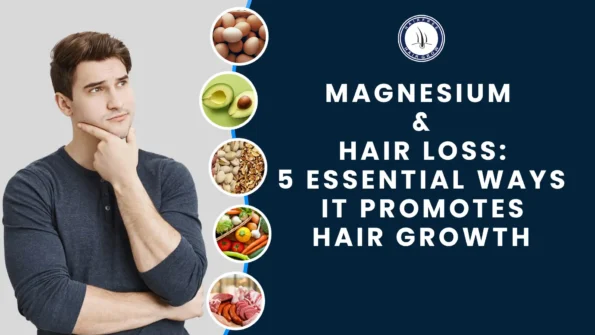If you’re struggling with hair loss, slow hair growth, or an itchy scalp, you’re not alone. Many people face these issues and look for natural solutions to promote healthier hair. One mineral that might surprise you in its effectiveness is magnesium. Yes, magnesium—commonly associated with bone health and muscle function—also plays a significant role in maintaining healthy hair. In this blog, we’ll explore 5 ways magnesium can prevent hair loss and the best ways to incorporate it into your routine. Magnesium and hair loss are connected, as low magnesium levels can weaken hair and lead to increased shedding.
Why Is Magnesium Important for Hair Health?
Magnesium is an essential mineral that affects various systems in your body. From regulating nerve function to supporting bone density, magnesium plays a key role in your overall health. But its impact goes beyond just these areas—it also affects the health of your hair.
Magnesium deficiency can lead to several issues, including hair loss. Magnesium helps balance many body processes that are vital for healthy hair. These include hormone regulation, nutrient absorption, and inflammation control. In fact, many hair loss conditions, like alopecia or scalp folliculitis, are linked to inflammation and poor nutrient absorption, both of which magnesium can help regulate.
But that’s not all. Magnesium also works in tandem with other nutrients like vitamin D, calcium, and biotin, all of which are essential for optimal hair growth. Keep reading to learn about the specific ways magnesium helps prevent hair loss and promotes hair growth.
Magnesium and Hair Loss: 5 Ways It Can Help Prevent Hair Fall
1. Magnesium and Hair Health
Magnesium is not just any nutrient—it’s a vital mineral that supports nearly every organ in your body. Despite its importance, many of us might not have enough magnesium in our systems. Inadequate magnesium levels can lead to hair loss, especially for those struggling with alopecia or scalp inflammation.
How Magnesium Helps
- Regulates Calcium: Magnesium helps control calcium buildup on the scalp, which can clog pores and hinder hair growth. It keeps calcium levels balanced, preventing hair follicle damage.
- Reduces Inflammation: Inflammation is a common cause of hair loss. Magnesium’s anti-inflammatory properties can protect hair follicles from damage.
- Activates Vitamin D: Magnesium activates vitamin D, making it usable by the body. Since vitamin D also promotes hair growth, magnesium plays an indirect but crucial role.
- Reduces Stress: Chronic stress can lead to hair shedding. Magnesium calms the body and reduces stress levels, contributing to healthier hair.
Sources of Magnesium
- Supplements: Magnesium glycinate is highly recommended for better absorption.
- Foods: Green leafy vegetables, salmon, pumpkin seeds, and nuts are excellent sources.
- Dosage: The recommended daily intake is 320-400 mg.
2. Vitamin D: The Growth Regulator
Vitamin D is both a nutrient and a hormone, playing a critical role in regulating the hair growth cycle. A deficiency in vitamin D can disrupt the cycle, leading to hair shedding and loss.
Benefits of Vitamin D
- Maintains healthy hair follicles.
- Regulates the hair growth cycle.
- Supports immune system function.
Sources of Vitamin D
- Sunlight: Spend at least 20 minutes daily in the sun.
- Supplements: Choose high-quality vitamin D supplements.
- Food: Fortified milk, fatty fish, and egg yolks.
Optimal vitamin D levels should range from 60 to 80 ng/mL. Levels below this can lead to hair thinning and loss.
3. Pumpkin Seed Oil: A Natural Powerhouse
Pumpkin seed oil is rich in antioxidants, zinc, and magnesium. It also helps combat excess dihydrotestosterone (DHT), a hormone linked to hair loss.
How Magnesium Helps
- DHT Blocker: Reduces the impact of DHT on hair follicles, preventing shrinkage and thinning.
- Rich in Nutrients: Provides essential vitamins and minerals for hair growth.
How to Use
- Supplements: Pumpkin seed oil capsules.
- Topical Application: Massage the oil directly onto the scalp.
4. Zinc: The Hair Repair Mineral
Zinc is another vital mineral that supports hair health. It helps repair damaged hair follicles, maintains oil glands, and prevents hair thinning.
Sources of Zinc
- Seafood, meat, nuts, and whole grains.
- Zinc supplements as directed by a healthcare professional.
5. Stress Management: The Hidden Factor
Chronic stress is a major contributor to hair loss. It disrupts the hair growth cycle and can lead to conditions like telogen effluvium.
How to Manage Stress
- Incorporate relaxation techniques like yoga or meditation.
- Ensure a balanced diet rich in magnesium and other nutrients.
- Get adequate sleep and regular exercise.
How to Incorporate Magnesium into Your Hair Care Routine
Now that we’ve established how magnesium supports hair health, let’s discuss how you can incorporate this vital mineral into your routine. Here are some tips:
1. Take Magnesium Supplements
If you’re not getting enough magnesium from food, supplements are a great way to fill the gap. The recommended daily dosage for magnesium is between 320 and 400 mg for most adults. If you’re looking for Which magnesium is best for hair growth, opt for Magnesium glycinate, as it’s highly absorbable and easy on the stomach.
2. Eat Magnesium-Rich Foods
You can also boost your magnesium levels by incorporating magnesium-rich foods into your diet. Some of the best sources include:
- Green leafy vegetables (e.g., spinach, kale)
- Nuts and seeds (e.g., almonds, pumpkin seeds)
- Fatty fish (e.g., salmon)
- Whole grains (e.g., brown rice, quinoa)
3. Use Magnesium-Infused Hair Products
Some hair care products are infused with magnesium, which can be beneficial for scalp health. Look for shampoos, conditioners, and scalp treatments that contain magnesium to enhance your hair care routine.
4. Get Sun Exposure
Magnesium works hand-in-hand with vitamin D to support hair health, and vitamin D is best absorbed through sunlight. While magnesium itself doesn’t come from the sun, getting enough sunlight for vitamin D can help optimize magnesium’s effect on hair growth.
5. Consult with a Professional
If you’re dealing with chronic hair loss or thinning hair, it’s always a good idea to consult with a trichologist or dermatologist. They can assess whether magnesium deficiency or other factors are contributing to your hair loss and recommend personalized treatment plans.
Conclusion: Magnesium Is Key to Healthier Hair
Magnesium is another important nutrient that can help with the prevention of hair loss and that promotes healthy hair growth. From fighting inflammation to enhancing calcium absorption to relaxing stress, magnesium supports the body in ways which directly benefit hair health.
So, if you struggle with hair loss or slow hair growth, maybe try supplementing with magnesium. From Magnesium hair growth before and after results to its ability to balance DHT levels, magnesium is a powerful ally in your hair growth journey. Magnesium glycinate for hair growth is an excellent supplement to try, but remember, incorporating magnesium-rich foods and reducing stress are also key components in achieving the best results.
If you’re looking to address hair growth holistically, don’t forget to consider magnesium alongside other essential nutrients like biotin and vitamin D. Start boosting your magnesium intake today, and see the difference it can make for your hair health!
Written By
MD (Skin & VD)
Dr. Santpal Sangwan, an expert in Magnesium and Hair Loss, specializes in promoting hair growth through innovative solutions. With extensive research on the topic, Dr. Sangwan offers valuable insights into 5 essential ways magnesium supports healthy hair growth for patients.
Disclaimer
We’ve made all possible efforts to ensure that the information provided here is accurate, up-to-date and complete, however, it should not be treated as a substitute for professional medical advice, diagnosis or treatment. See Detailed Disclaimers Here.


